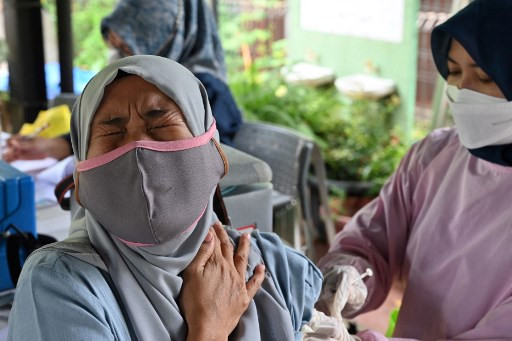Future pandemic policies to be based on serology survey results
Third dose for elderly sluggish at 32%, only 1.2% have fourth dose.
Change text size
Gift Premium Articles
to Anyone

T
he government is going to wait on the results of next year’s serosurvey to decide future pandemic policies, including whether or not the second booster dose would be expanded to the wider population, and if so when.
The government last month expanded eligibility for a second booster dose to those aged 60 and above. The elderly join medical frontliners, who have been the first group to roll up its sleeves for a fourth jab, the second booster dose, since August.
When asked when a broader adult population could get their second booster dose, Health Ministry official Siti Nadia Tarmizi told The Jakarta Post on Monday that it would depend on the results of an upcoming serology survey, which would start in early January.
“[We are also waiting] on further recommendations from the World Health Organization and the Indonesian Technical Advisory Group on Immunization [ITAGI],” Siti said.
When asked what aspects of the serology survey would determine how the second booster dose would be expanded, Siti said that the government was still waiting for “experts’ deliberation”.
Those aged 18 or older, including the elderly, have been eligible for a third dose since January of this year, when the highly contagious Omicron variant triggered a third wave of infections in the country. But health authorities have said too few people were taking advantage of it. Only 28 percent of the total target population had received the first booster dose by Tuesday, government data showed. A closer look at the data also suggests that the inoculation of the third dose for the elderly remains sluggish, at 32 percent. Meanwhile, some 1.2 percent of the elderly have gotten their fourth dose.
Read also: Elderly now eligible to get second COVID-19 booster dose
The elderly are the most vulnerable to developing severe illness from the virus, and close to half of the country’s total 160,000 COVID-19 deaths recorded since the pandemic began were people aged 60 and above.
The coverage of two-dose primary vaccination series for all age groups has also been stagnant at around 70 percent since late April.
Echoing Siti, Coordinating Economic Minister Airlangga Hartarto, who oversees the pandemic response in regions outside Java and Bali, said that the coming serology survey would determine the direction of pandemic policies and likely the booster strategy.
“Given the current situation, the Health Ministry will conduct another [serology] survey. The government will then decide on [future pandemic handling] policies accordingly,” Airlangga said last week, as quoted by kompas.com.
Year-end holidays
When the government expanded access to a fourth shot late last month, the country’s daily coronavirus caseload was spiking at around the 7,000-mark – a surge in infections thought to be tied to the highly contagious XBB, an emerging subvariant of Omicron. New cases have since declined, with authorities reporting 2,117 cases on Tuesday.
Read also: Govt to maintain relaxed COVID-19 curbs for holiday season
But, with the threats posed by the BN.1 – the Omicron variant’s new sublineage, which has been reported in the country – and the expected increase in public mobility due to the year-end holidays, epidemiologist Dicky Budiman urged the government to expand the second booster shots to a wider population.
“To delay [giving the second booster dose to the general public] is the same as adding
unnecessary risks,” Dicky said on Tuesday. “I don’t see a correlation between the urgency for booster shots and the serology survey, since it does not accurately portray the level of protection amid the public.”
According to Dicky, the ability of coronavirus variants to mutate is based on how effective they attach to the angiotensin-converting enzyme 2 (ACE2) – which essentially acts as a port of entry that allows the coronavirus to invade cells and replicate – and how evasive they are to immunity.
“The danger of the BN.1 subvariant is that it is excellent at doing both,” Dicky said. “This makes it particularly dangerous to those with waning immunity.”
Third serosurvey
The upcoming January survey will be the third survey the country conducted since it detected the first COVID-19 cases in March 2020.
Read also: Almost all Indonesians have antibodies against COVID-19, blood survey shows
The latest survey in July of this year, which examined blood samples from some 20,000 people in 100 cities across the archipelago, found that around 98.5 percent of them had antibodies against the virus, due to vaccination or past infections.
The figure is around 10 percentage points higher than the 87.8 percent recorded in the previous survey in December, which involved the same respondents.









